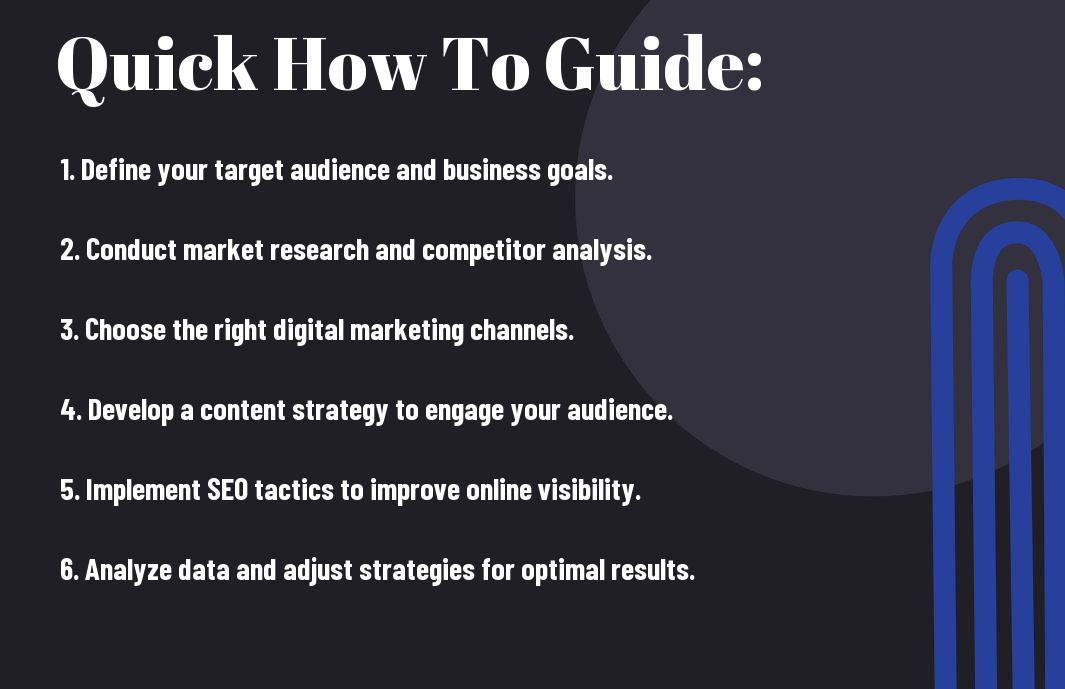You want your startup to succeed in the digital world, and a winning digital marketing strategy can make that happen. Whether you’re just starting out or looking to revamp your current approach, this step-by-step guide will help you navigate the intricacies of online marketing. For a comprehensive overview of digital marketing tactics specifically tailored for startups, check out The Ultimate Guide to Digital Marketing for Startups. Let’s get your startup noticed!
Key Takeaways:
- Understand Your Target Audience: It is crucial to identify your target audience, their preferences, behavior, and needs to tailor your digital marketing strategy.
- Set Clear Goals and KPIs: Establishing measurable goals and key performance indicators (KPIs) will help track the effectiveness of your digital marketing efforts and make necessary adjustments.
- Utilize Multiple Channels: Leveraging various digital marketing channels such as social media, email marketing, SEO, and content marketing can help reach a wider audience and maximize impact.
Understanding Your Target Audience
Identifying Your Ideal Customer
Before exploring into creating your digital marketing strategy, it’s vital to clearly identify your ideal customer. This involves understanding their demographics, behavior, preferences, and pain points. By defining your target audience, you can tailor your marketing efforts to speak directly to their needs and interests.
Analyzing Your Competitors
With the competitive landscape constantly evolving, it’s crucial to analyze your competitors to stay ahead in the game. By researching what your competitors are doing in terms of marketing strategies, product offerings, and customer engagement, you can identify opportunities and gaps in the market that you can capitalize on.
For instance, you can study their social media presence, website content, and customer reviews to gain insights into what is resonating with their audience and where they might be falling short.
Understanding Their Pain Points and Needs
Your target audience likely has specific pain points and needs that your product or service can address. By understanding these critical aspects, you can tailor your messaging and value proposition to directly speak to their challenges and offer solutions that meet their requirements.
Plus, by showcasing how your offering can solve their problems effectively, you can build trust and credibility with your audience, ultimately converting them into loyal customers.

Setting Clear Goals and Objectives
If you want your startup to succeed in the digital world, it’s crucial to start by setting clear goals and objectives for your digital marketing strategy. Without a roadmap of where you want to go, it’s easy to get lost in the vast online landscape. By defining your goals upfront, you can create a focused and effective strategy that will guide your efforts and help you measure success along the way.
Defining Key Performance Indicators (KPIs)
If you want to track the progress and success of your digital marketing efforts, you need to define Key Performance Indicators (KPIs). These are specific metrics that will help you measure the performance of your campaigns and determine if you are meeting your goals. KPIs can include website traffic, conversion rates, social media engagement, email open rates, and more. By establishing KPIs, you can ensure that your strategy is on track and make adjustments as needed to stay on course.
Establishing Realistic Targets and Timelines
You should set realistic targets and timelines for your digital marketing strategy to keep your team focused and motivated. Achieving small victories along the way can boost morale and drive continued progress towards your ultimate goals. By setting realistic targets, you can avoid setting yourself up for disappointment and instead celebrate each milestone as you move closer to your objectives. Plus, having clear timelines in place can help you prioritize tasks and allocate resources efficiently.
Plus, by establishing realistic targets and timelines, you can also better track your progress and make any necessary adjustments to your strategy. If you find that you are consistently falling short of your targets, you can reevaluate your approach and pivot as needed to ensure that you are on the path to success.
Aligning Goals with Business Objectives
Even though your digital marketing goals may be specific to your online presence, it’s important to align them with your overall business objectives. Your digital marketing strategy should ultimately serve the larger goals of your startup, whether that’s increasing sales, expanding your customer base, or raising brand awareness. By aligning your goals with your business objectives, you can ensure that every digital marketing effort contributes to the growth and success of your startup.
Indicators: By aligning your digital marketing goals with your business objectives, you can ensure that your efforts are strategic, purposeful, and impactful. This alignment can help you focus on what truly matters for the success of your startup and avoid getting sidetracked by vanity metrics that don’t contribute to your bottom line. Keep your eye on the prize by aligning your goals with your business objectives.
Developing a Comprehensive Digital Marketing Plan
Crafting a Unique Value Proposition (UVP)
Unlike established companies, as a startup, you need to differentiate yourself to stand out in the market. Crafting a unique value proposition (UVP) is crucial as it defines why customers should choose your product or service over competitors. Your UVP should clearly articulate what sets you apart, who your target audience is, and how you solve their problem better than anyone else.
Choosing the Right Digital Channels
Comprehensive digital marketing involves selecting the right digital channels that resonate with your target audience. Each platform serves a different purpose and reaches distinct demographics. Understanding where your audience spends their time online will help you focus your efforts efficiently. Embrace unique channels that align with your brand identity and messaging to maximize your reach and engagement.
Channels like social media marketing, search engine optimization, email campaigns, and influencer partnerships can all play a role in reaching your target audience effectively.
Allocating Resources and Budget
Some of the key components of a successful digital marketing plan involve allocating resources and budget strategically. Your budget should reflect your goals and consider the costs associated with various marketing tactics. By carefully evaluating the return on investment (ROI) for each channel and tactic, you can optimize your spending for maximum impact.
Plus, don’t forget to allocate resources for tracking and analyzing your campaigns to make data-driven decisions and continuously improve your strategies.

Building a Strong Online Presence
Creating a Professional Website
Your startup’s website is often the first point of contact between you and your potential customers. It’s crucial that your website makes a strong impression. Ensure that your website is professionally designed, easy to navigate, and mobile-responsive. Your website should clearly communicate your brand’s message and unique value proposition. Include high-quality images and engaging content to capture visitors’ attention and keep them interested.
Leveraging Social Media Platforms
Platforms like Facebook, Instagram, Twitter, and LinkedIn can be powerful tools for reaching and engaging with your target audience. You can use these platforms to share valuable content, interact with customers, and build brand loyalty. Choose the platforms that are most relevant to your audience and create a content strategy that resonates with them.
This approach will help you to build a community around your brand, drive traffic to your website, and generate leads. Be consistent in your posting schedule and engage with your followers to create a strong online presence.
Establishing a Consistent Brand Identity
To establish a consistent brand identity, you need to define your brand values, voice, and visual elements. To convey a strong and cohesive brand image across all online channels, including your website and social media profiles. Use the same colors, fonts, and tone of voice to create a memorable brand experience for your audience.
Presence Consistency is key in building brand recognition and trust with your customers. By maintaining a consistent brand identity, you can differentiate yourself from competitors and create a strong position in the market.
Content Creation and Distribution Strategies
Developing a Content Calendar
There’s no doubt that consistency is key when it comes to your digital marketing efforts. Planning out your content in advance through a content calendar can help you stay on track and ensure that you are regularly engaging with your audience. By mapping out your content topics, formats, and posting schedule, you can maintain a consistent flow of information that keeps your audience interested and coming back for more.
Crafting Engaging and Relevant Content
If you want to capture the attention of your audience, crafting engaging and relevant content is vital. You need to understand your target audience and what interests them in order to create content that resonates with them. Whether it’s informative blog posts, entertaining videos, or engaging social media posts, make sure your content provides value to your audience and encourages them to interact with your brand.
With the vast amount of content available online, you need to ensure that yours stands out. Consider incorporating visual elements, storytelling techniques, and interactive features to make your content more engaging and memorable for your audience.
Amplifying Content through Paid Advertising
Advertising can play a crucial role in getting your content in front of a larger audience. By utilizing paid advertising channels such as social media ads or search engine marketing, you can target specific demographics, interests, and behaviors to reach potential customers who may not have discovered your content organically. This can help boost your brand’s visibility and drive more traffic to your website or social media channels.
This additional exposure can lead to increased brand awareness, website traffic, and ultimately, conversions for your startup. Be sure to analyze the performance of your paid advertising campaigns regularly and adjust your strategy as needed to optimize your results and reach your marketing goals.
Measuring and Optimizing Performance
Tracking Key Metrics and Analytics
Performance is key when it comes to measuring the success of your digital marketing strategy. By tracking key metrics and analytics, you can gain valuable insights into how your campaigns are performing. Metrics like website traffic, conversion rates, click-through rates, and social media engagement can help you understand what is working well and what areas need improvement. Using tools like Google Analytics, you can easily monitor these metrics and make data-driven decisions to optimize your strategy.
Conducting Regular Performance Reviews
Even the most well-thought-out digital marketing strategy needs regular performance reviews to ensure it is delivering results. Set aside time each month to review the key metrics and analytics from your campaigns. Look for patterns, trends, and areas where you can make improvements. With regular reviews, you can make necessary adjustments to your strategy, reallocate resources, and experiment with new tactics to drive better results.
Additionally, consider setting up a system for continuous monitoring and reporting. By doing so, you can quickly identify any issues or bottlenecks in your strategy and address them promptly.
Making Data-Driven Decisions
Little decisions can make a big impact on the success of your digital marketing efforts. By making data-driven decisions, you can optimize your strategy for maximum results. Analyze the metrics and analytics regularly to identify trends and opportunities. Use A/B testing to experiment with different approaches and see what resonates best with your audience. It is crucial to rely on data rather than assumptions to make informed decisions that will drive your startup’s growth.
To wrap up
Ultimately, creating a winning digital marketing strategy for your startup requires careful planning and execution. By defining your target audience, setting clear goals, utilizing the right tools and channels, and consistently analyzing and optimizing your campaigns, you can effectively reach and engage with your potential customers online.
Note, digital marketing is a dynamic field that constantly evolves, so it’s important to stay updated on the latest trends and best practices. By staying adaptable and open to trying new strategies, you can continue to grow your startup’s presence and build a loyal customer base in the digital realm.